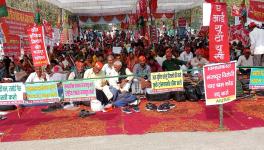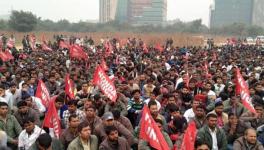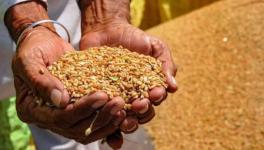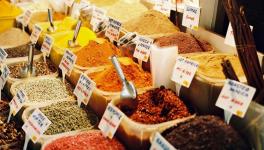Jan 8 Strike: Workers Fight Back Deadly Price Rise
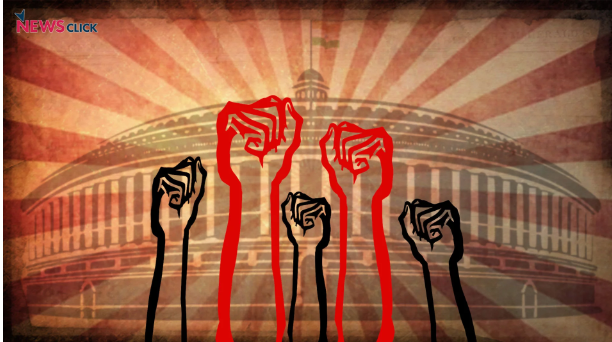
Here is a shocking fact: retail prices of wheat have increased by 56%, atta (wheat flour) by 26% and those of rice by 14% in the past one year but the Modi government was sitting on record stocks of foodgrain, some 567 lakh tonnes in December 2018, up 25% over last year, and more than double the foodgrain stocking norm of 214 lakh tonnes.
This grim contradiction highlights two failures of the Modi government in one shot. On the one hand, they have no policy for controlling prices of essential food items which have been steadily rising in the past one year. On the other hand, they are obstinately refusing to allow more foodgrain to flow through the public distribution system (PDS), which would cool food prices and fill millions of hungry stomachs.
Both these issues are part of the workers’ demands for which a historic strike will be observed on January 8, 2020. It has been called by 10 central trade unions and several independent federations and the reports of preparations suggest unprecedented support for the action. Over 100 farmers’ organisations have called for simultaneous Grameen Bandh (rural strike), while several student organisations have joined in by appealing for a strike in educational institutions on the same day.
Zooming Prices of Food Items
First, have a look at the chart below at how much the prices of common food items have risen in just one year, between January 2019 and January 2020. The figures have been taken from the Department of Consumer Affairs’ website, which gives prices of 22 food items collected daily from 114 cities and towns across the country.
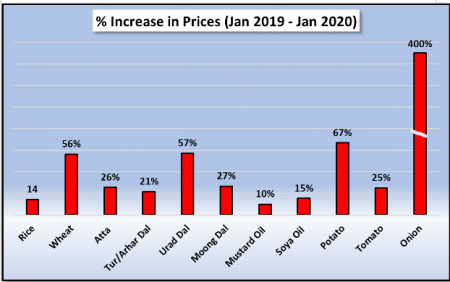
Remember that the official inflation rate based on the Consumer Price Index is an average of all commodities and in any case does not really reflect what the common person pays at the provisions shop or to the vegetable seller. Clearly, the price increase is far more than what the official rate of around 6% reflects.
Cereals, pulses (dals), cooking oils and the Big Three in vegetables (potato, onion and tomato) are staples throughout India. Most of these items seem to be on fire, with wheat prices going up by 56%, atta by 26%, three common pulses going up by over 20% (urad by a staggering 57%), two common oils by 10-15%. Potato prices have shot up by 67% and onion prices have increased five times. Despite clueless groping about by the Modi government – like importing some onions – nothing is changing.
Data released by the Ministry of Statistics shows that in November 2019, food inflation was 8.66% compared with the general inflation level of 5.54%. One year ago, food inflation was recorded at (-)2.2% (that is, prices were declining) and general inflation stood at 1.97%. It is evident that in one year, the Modi government has lost control of the price situation. Coming as it does along with record levels of unemployment and stagnating wages, this back-breaking price rise is destroying lives of working people families.
Overflowing Foodgrain Stocks
Meanwhile, foodgrains continue to pile up in government warehouses as the country produces more and more and procurement by government transfers a chunk of the harvest into them. Throughout this year, actual stocks (comprising rice, wheat and some coarse grains) have far exceeded stock norms, which include strategic reserves of 30 lakh tonnes wheat and 20 lakh tonnes rice. [See chart below] Norms vary with seasons, as indicated.
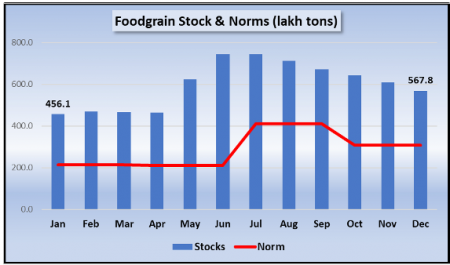
What should happen is that the stocked foodgrain should flow out quickly to ration shops across the country and reach homes of people suffering from malnutrition and hunger. This will not only provide direly needed sustenance to working people’s families but will also cool down prices in the open market. It would also boost demand in general because people will not have to spend as much on essential food. But the Modi government’s dogmatic commitment to squeezing state-run welfare programmes and cutting subsidies, prevents this most reasonable course of action.
The trade unions and farmer organisations are demanding that the PDS should be strengthened, expanded and universalised. More food items should be included, coverage should be extended to all families and prices kept as low as possible.
The coming January 8 all-India strike, apart from raising all the other demands like end to public sector sell off, increase in job opportunities, scrapping of changes in labour laws, end of contractorisation, etc. is pressing for this important demand of controlling price rise and expanding PDS, which affects not just workers but all sections of society.
But Mr. Modi and Mr. (Amit) Shah (Home Minister) are busy imposing draconian citizenship laws and tinkering around with the Constitution, uncaring of the plight of people. The strike is another effort to shake them up.
Get the latest reports & analysis with people's perspective on Protests, movements & deep analytical videos, discussions of the current affairs in your Telegram app. Subscribe to NewsClick's Telegram channel & get Real-Time updates on stories, as they get published on our website.









